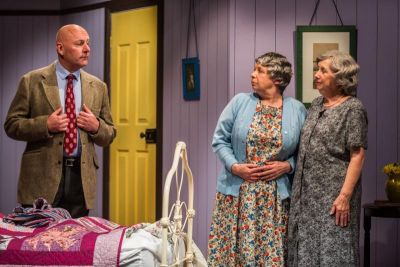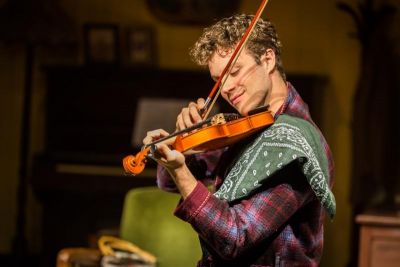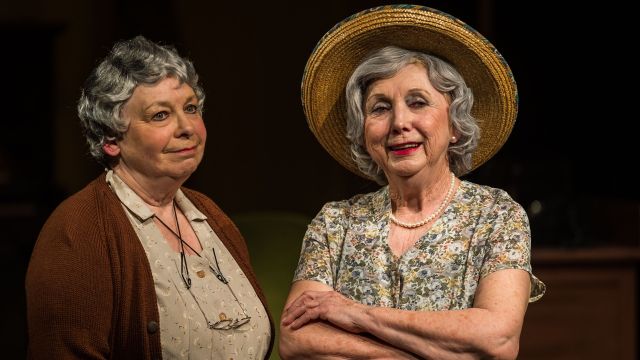Ladies in Lavender
Director Meredith Jacobs and her design team have lovingly converted the stage of the Pavilion Theatre to a seaside cottage in Cornwall in 1937. Family photographs hang from brown picture rails. A mantle clock sits on the shelf above the fireplace. Two easy chairs with crocheted antimacassars are turned to face the sea.
From them, the ageing Widdington sisters, Janet and Ursula, look over a carefully tended garden to the rocky shore below, where, after a stormy night, they find a young man near to death. He is Andrea Marowski, a violinist from Poland, who was hoping to make his fortune in America. They take him in, nurse him back to health and become increasingly attached to him – Ursula especially.
 Based on a story by William J. Locke, the 2004 screenplay of Ladies in Lavender was written by Charles Dance. In adapting it for the stage, playwright Shaun McKenna has lovingly retained the evocative poignancy of the story and its heart-warming characters. With original music (Joshua McNulty), stylish period costumes (Annette Snars) and mellow lighting (James Winters), Jacobs brings those characters to life in a sensitively realised and carefully controlled production.
Based on a story by William J. Locke, the 2004 screenplay of Ladies in Lavender was written by Charles Dance. In adapting it for the stage, playwright Shaun McKenna has lovingly retained the evocative poignancy of the story and its heart-warming characters. With original music (Joshua McNulty), stylish period costumes (Annette Snars) and mellow lighting (James Winters), Jacobs brings those characters to life in a sensitively realised and carefully controlled production.
Sandy Velini is endearing as the gentle, caring Ursula. With expressive wistfulness, Velini invokes her own girlish youth to find the tender frailty and fragilty of this character. She infuses into her relationship with Andrea the melancholy of unfulfilled dreams and lost experiences, though she knows full well that Andrea sees her only as a loving friend. Velini’s characterisations are always carefully conceived, and her Ursula is touchingly real.
Jennifer Leslie plays Janet, the older and more pragmatic of the sisters. Leslie portrays the sensible matter-of-factness of this character in her brusque dealings with the daily ‘help’ Dorcas and her tolerance of Ursula’s dreaminess. But she is also understandingly indulgent of of Ursula’s infatuation, recalling her own experience of a young love lost to war.
 Mary Clarke is playfully brash and exuberant as Dorcas. She is lively, nosey, and meddlesome; her sassy disrespect and animated facial expressions a constant contrast to the lady-like reserve the sisters. She plies the visiting Dr Mead (played with dutiful pomp by David Hill) with cherry scones and flirtatious coyness.
Mary Clarke is playfully brash and exuberant as Dorcas. She is lively, nosey, and meddlesome; her sassy disrespect and animated facial expressions a constant contrast to the lady-like reserve the sisters. She plies the visiting Dr Mead (played with dutiful pomp by David Hill) with cherry scones and flirtatious coyness.
In this quiet, restrained household, Julian Florian as Andrea brings the spark of hopeful youth. Tall and becoming, Floriano makes this role his own. His initial tentative hesitancy morphs into engaging acceptance and trusting confidence, especially when he begins to play the violin – which Floriano does with incredible verisimilitude.
The almost established calm of the household is upset by the appearance of Olga Danilov, sister of a world-famous violinist. She hears Marowski’s playing, realises his talent and spirits him away to London to meet her brother – and fame. Susie Herring is unwittingly benign as Olga, not realising at all the pain that will be left behind.
Jacobs has accentuated the gentle humour and tender compassion of McKenna’s writing in this moving production.
Carol Wimmer
Photographer: Chris Lundie
Subscribe to our E-Newsletter, buy our latest print edition or find a Performing Arts book at Book Nook.

